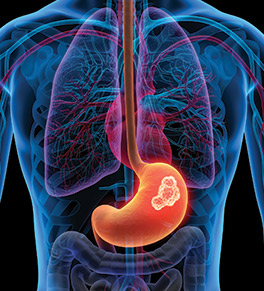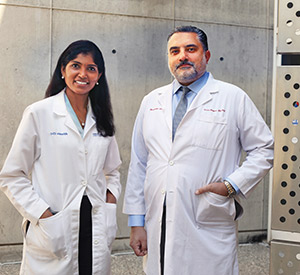Gastric cancer patient gets new lease on life

"The hope is to turn incurable disease to curable disease,” medical oncologist Dr. Farshid Dayyani says of a novel clinical trial to improve treatment for late-stage stomach cancer.
For years, Aparecida Bernjak endured rounds of tests, including endoscopies and colonoscopies, all of which failed to identify the cause of her persistent stomach pain.
Finally, in 2021, the retired nurse collapsed in her Signal Hill home. Rushed to a nearby hospital, she was diagnosed with late-stage stomach cancer, called gastric carcinomatosis. Doctors there could offer her little in the way of treatment. Instead, they referred her to the UCI Health Chao Family Comprehensive Cancer Center.
Fortuitously, the only National Cancer Institute-designated cancer center based in Orange County had just launched the first U.S. clinical trial to test a novel treatment protocol that aims to extend the lives of gastric cancer patients whose disease has spread to their abdominal cavity.
The phase 2 STOPGAP trial has given Bernjak, one of its earliest participants, a new lease on life even as it is advancing critical knowledge about the disease.
A 'worrisome trend'
More than a century ago, stomach cancer was one of the most common types of cancer in the United States. High rates were mostly blamed on consumption of nonrefrigerated, highly salted foods.
Today, cases have plunged — but not everywhere. In Orange County, rates of the dangerous disease remain high for some ethnic groups, including Hispanics and Asians, and even among younger adults.
UCI Health gastric cancer experts Dr. Maheswari Senthil and Dr. Farshid Dayyani have made it their mission to address this worrisome trend.
“Not only do Hispanics have a higher incidence of gastric cancer, this disease often isn’t detected until it has spread into the abdomen,” says Senthil, a surgical oncologist and expert in metastatic abdominal cancers.
“At UCI Health, we serve a large Hispanic population. The high incidence of the disease among them means we need other solutions.”
A variety of risk factors may be responsible for the increased rates among Hispanics and Asians, says Senthil, medical director of the UCI School of Medicine’s Center for Clinical Research. These include exposure to Helicobacter pylori (H. pylori) — a bacterium found in contaminated drinking water — along with diet, lifestyle, race or ethnicity and, potentially, a genetic predisposition.
Treatment options are limited for patients diagnosed with late-stage disease. The standard treatment, intravenous (IV) chemotherapy, typically slows the cancer’s growth for no more than six months.
Breaking the peritoneal barrier
“This is a very challenging disease,” says Senthil, who on one recent day saw five patients with gastric carcinomatosis, four of whom were under age 50. “It just breaks my heart. We have to do something about it. The only way we’re going to advance treatments is through clinical trials.”
That passionate commitment led Senthil and Dayyani, a medical oncologist, to design a novel approach, delivering chemotherapy directly into the abdomen, because evidence suggests that chemo administered intravenously can’t penetrate the abdominal lining, called the peritoneum.
Gastric carcinomatosis patients who respond well to initial IV chemotherapy may be eligible for that next step — three months of high-dose chemotherapy infused through a port into the peritoneum along with continued IV chemo to shrink and hopefully eradicate the tumors.
Senthil then performs cytoreduction surgery to remove all visible signs of cancer from the abdominal cavity. The area is then bathed in a heated solution of chemotherapy for about 90 minutes to kill any remaining microscopic cancer cells — a procedure called hyperthermic intraperitoneal chemotherapy (HIPEC). Afterward, patients receive monthly infusions of immunotherapy drugs to prompt the body’s immune system to recognize and fight any recurrence.
A path to becoming disease-free
“The hope is to turn incurable disease to curable disease,” says Dayyani, medical director of the cancer center’s Sue and Ralph Stern Center for Cancer Clinical Trials and Research and a nationally regarded expert in gastrointestinal cancers. “The STOPGAP trial tries to lead patients on a path to surgery that might render them disease-free.”
The problem, Dayyani explains, is that when a cancer is so aggressive it breaks through the best neoadjuvant IV chemotherapy, the cancer will come back before the patient recovers from surgery. "That's why we are treating the cancer with direct and IV chemotherapy, to shrink it. Surgery is the last part — to remove whatever else is left.”
Their goal is to demonstrate that the combination therapy is safe and improves patient survival rates. Data from the phase 2 trial, which may enroll as many as 35 participants, are expected in about two years.
“We are closely tracking the steps trial participants go through to see if the treatment makes a meaningful difference in outcomes,” says Senthil, who is conducting additional research using sophisticated tumor models to better match individual patients with beneficial medications.
“We will keep improving on what we learn," she adds, noting that such collaborative research is rare outside an academic health system and comprehensive cancer center.
Where skill and passion come together
“UCI Health allows like-minded people who are skilled and passionate about what they do to come together and solve these complex problems. To do a clinical trial like this you need a very strong surgical skill set — people who have knowledge about the cancer and its biology. You need medical oncologists who are equally skilled in managing patients with gastric carcinomatosis. That’s the advantage of an academic health system. You can’t replicate this care outside a health system like ours.”
Bernjak agrees. “UCI Health has everything, all the clinics, the scans, the labs. It’s very convenient."
Now 76, she remains in remission with no evidence of cancer more than a year after her initial diagnosis. She is still astonished that she navigated her treatments and surgery without severe side effects.
“It sounds ridiculous to say, but I had a great time. They were treating something really bad, but I didn’t suffer."
Bernjak, who went on to receive regular immunotherapy infusions to further decrease the chance of disease recurrence, is thrilled with the care she received. She says she has been able to resume yoga practice, outings with her Pomeranian and gourmet cooking.
“I faced the situation,” she says. “I’m happy and enjoying life.”
The STOPGAP trial was made possible with funds from the Stern Center and seed money from the UCI Anti-Cancer Challenge, the cancer center’s annual ride/run/walk event, which has raised $3.6 million over the last six years to support such investigator-initiated pilot projects.
The UCI Chao Family Comprehensive Cancer Center is at the forefront of discovering new ways to fight cancer. As one of only 53 NCI-designated comprehensive cancer centers in the nation, the center combines leading-edge research, clinical trials and world-class care for patients. In 2020 alone, more than 7,250 new patients benefited from the cancer center's advanced treatments.
Related stories
Explore further
Browse more blog posts by topic.





